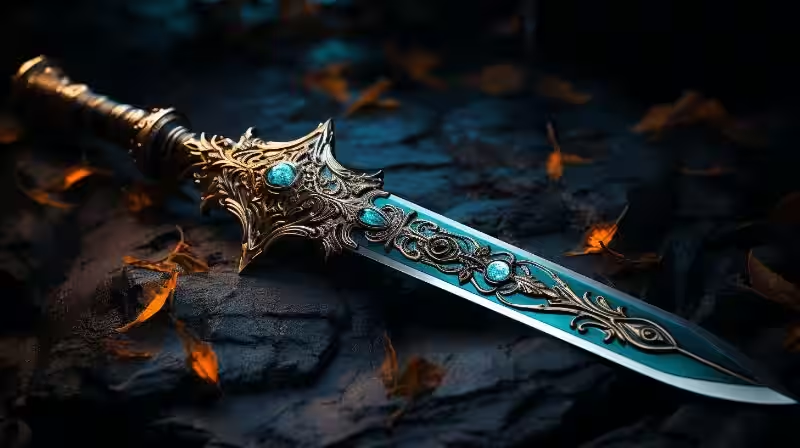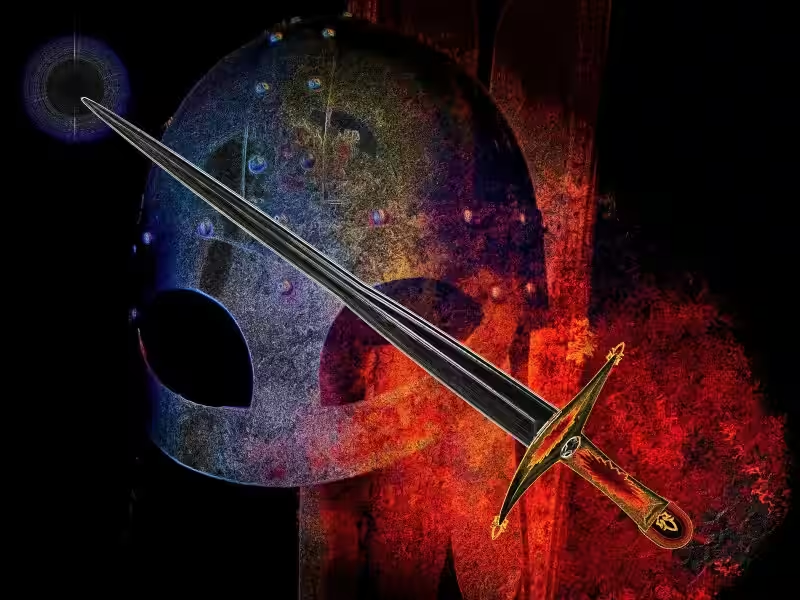The Symbolism of the Sword: More Than Just a Weapon

The sword, a seemingly simple tool, has resonated deeply throughout human history, transcending its practical function as a weapon to become a powerful symbol laden with multifaceted meanings. Its imagery appears in countless contexts, from religious iconography to modern-day logos, consistently communicating strength, authority, and a range of other potent ideas. Understanding the symbolism of the sword requires exploring its diverse representations across various cultures and time periods.
Power, Authority, and Justice: The Sword’s Core Meanings
The most fundamental symbolism of the sword is its association with power and authority. Historically, swords were symbols of kingship and military might, wielded by rulers and commanders to signify their dominance and legitimate rule. The act of carrying a sword, often adorned with intricate designs and precious metals, served to visually reinforce the wearer's status and authority.
This association with power extends beyond earthly rulers. Many cultures have depicted deities and divine beings wielding swords, underscoring their control over the mortal realm and the ability to mete out justice. The divine right to rule, often symbolized by a sword, connected earthly authority to a higher power, lending legitimacy to the ruler's claim.
Justice and Righteousness: The Sword as an Instrument of Good
Beyond mere power, the sword frequently represents justice and righteousness. This interpretation stems from its role as a tool for defending the innocent, punishing the wicked, and upholding a moral code. The image of a hero or champion wielding a sword to combat evil is a timeless archetype prevalent in literature, mythology, and popular culture.
The Arthurian legends offer a quintessential example, where Excalibur embodies King Arthur's rightful claim to the throne and the chivalric ideals of his knights. This connection between the sword and justice persists in modern usage, continuing to symbolize the fight against injustice and the pursuit of a higher moral standard.
The Sword in Religious Symbolism: Spiritual Warfare and Divine Power
The symbolism of the sword extends deeply into the religious sphere. Across many faiths, the sword represents spiritual power and the struggle against evil. In Christianity, the sword is often associated with the triumph of good over evil. Saint Michael, the archangel, is consistently depicted wielding a sword, symbolizing his role in defeating Satan and defending God's creation.
The Book of Revelation further reinforces this symbolism, describing the word of God as "sharper than any two-edged sword," emphasizing its power to pierce falsehood and reveal truth. This reinforces the sword's connection to spiritual warfare, representing the ongoing battle between good and evil, light and darkness.
Eastern Perspectives: Honor, Discipline, and Spiritual Mastery
Eastern cultures have also imbued the sword with profound meaning, often associating it with spiritual concepts and moral codes. In Japan, the katana, the curved sword of the samurai, embodies honor, skill, and unwavering loyalty to one's lord. The katana is more than just a weapon; it represents the warrior's spirit, reflecting the principles of Bushido, emphasizing courage, self-discipline, and unwavering commitment.
Similarly, in Hinduism and Sikhism, the sword, often double-edged like the Khanda (a central symbol of Sikhism), symbolizes divine power and the ability to overcome evil. Deities such as Shiva and Kali are frequently depicted wielding swords, showcasing their capacity for both creation and destruction, protection and punishment. The Khanda's symbolism within Sikhism also represents the community's resilience and determination.
The Enduring Legacy: The Sword in Modern Contexts
The enduring power of the sword's symbolism is evident in its continued presence in modern society. Logos for sports teams, military organizations, and various other groups frequently incorporate swords, leveraging their inherent symbolism of strength, power, and honor.
This continued usage demonstrates the rich history and multifaceted nature of the sword's symbolism. Its enduring appeal demonstrates its capacity to resonate with audiences across different cultures and time periods, maintaining its relevance even in a world increasingly shaped by technology.
Deconstructing the Symbolism: Nuances and Variations
It's crucial to note that the symbolism of the sword isn't monolithic. The specific meaning can shift depending on context, the type of sword depicted (e.g., a longsword versus a rapier), its position (upright, downward, broken), and the cultural lens through which it is viewed.
A broken sword might allude to defeat or loss of power, while a sheathed sword could signify peace or restraint. The specific type of sword can also hold significance; a ceremonial sword might denote authority, while a battle-worn blade might convey experience and resilience. Therefore, appreciating the full complexity of the sword's symbolism requires careful consideration of these contextual factors. The symbolism of the sword is a rich tapestry, woven from threads of cultural beliefs, historical experiences, and evolving societal values. Its enduring power lies in its ability to represent a broad spectrum of human experiences and aspirations, encompassing power, justice, spirituality, and the relentless struggle between good and evil.
Frequently Asked Questions: The Symbolism of the Sword
What is the general symbolism of a sword?
The sword, far beyond its function as a weapon, holds a rich and complex symbolism across various cultures and time periods. Generally, it represents power, authority, and justice. However, the specific connotations can vary greatly depending on the context in which it's presented. Its symbolism often extends beyond the purely physical, encompassing spiritual, moral, and societal implications.
How is the sword associated with purification and divine power?
The sword's connection to purification and divine power is prominent in many traditions. The double-edged, wavy, flame-like sword, especially in alchemy, symbolizes fire and transformative power. This association links directly to its frequent depiction as an instrument of justice, wielded by heroes and figures of authority to combat evil and uphold moral codes. Examples include Excalibur in Arthurian legend, and Saint Michael's sword in Christianity.
What is the sword's significance in religious contexts?
In Christianity, the sword symbolizes the triumph of good over evil. Saint Michael's sword represents the defeat of Satan, and the Book of Revelation describes the word of God as a sharper-than-any-sword instrument of truth. This reinforces the sword's association with spiritual power and the fight against darkness. Eastern religions like Hinduism and Sikhism also utilize the sword as a symbol of divine power and the ability to vanquish evil, often depicted in the hands of powerful deities like Shiva and Kali, or as a central symbol like the Khanda in Sikhism.
What does the sword symbolize in Eastern cultures?
In Japan, the katana, the samurai sword, embodies honor, skill, and unwavering devotion to one's lord, reflecting the principles of bushido (the samurai code). It represents the warrior's spirit and dedication to a higher purpose. The double-edged sword, frequently seen in Hinduism and Sikhism, also embodies divine power and the capacity to overcome evil.
What is the significance of the sword in modern usage?
The enduring power of the sword as a symbol is evident in its continued use in modern logos for sports teams, military organizations, and other groups. This reflects its persistent association with strength, power, and honor, demonstrating the lasting impact of its rich history and multifaceted symbolism across millennia.
In summary, what are the key aspects of sword symbolism?
The symbolism of the sword is a complex and multifaceted concept. It's a tapestry woven from threads of justice, divine power, spiritual warfare, and cultural identity, consistently signifying strength, authority, and the pursuit of a higher ideal. The sword's meaning evolves depending on cultural context and historical period, but its potent symbolism endures.








